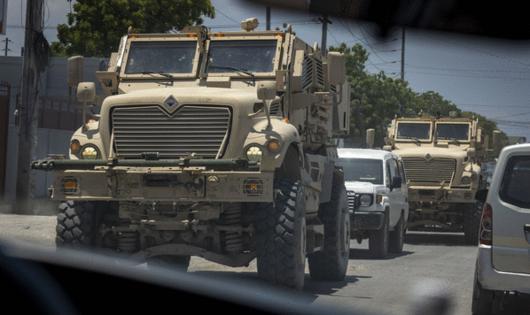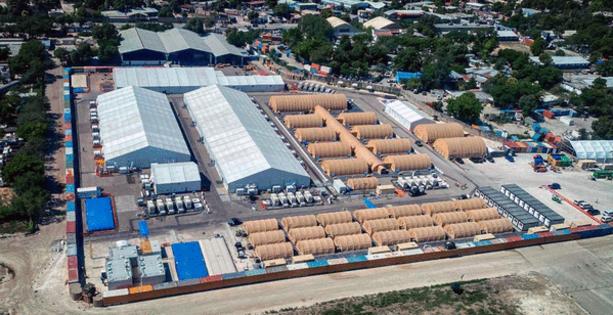International effort to help Haiti fight deadly gangs is in danger of falling apart
Published in News & Features
From the onset, the international mission to help Haiti wrest back control from armed gangs faced challenges and skepticism.
There were legal challenges in Nairobi and pushback in Washington from congressional Republicans as the Biden administration sought to provide the first $40 million in seed money to get the Kenya-led mission going, as a united front of powerful armed gangs mounted a broad assault in Port-au-Prince to take down the government.
Now, nearly a year after the arrival of the first 200 Kenyan police officers in June of 2024, the Multinational Security Support mission is in danger of falling apart amid a worsening humanitarian and security crisis in Haiti, a lack of strategy by the United States and paralysis at the U.N. Security Council.
In June, the operator of the U.S.-built mission base adjacent to the Port-au-Prince international airport needs to be notified if they will get a $200 million payment to continue operations for six months after the contract comes up for renewal in September. Meanwhile, money is still needed for critical equipment, more troops and forward operating bases.
According to the U.N., pledges received in cash to a Trust Fund for the mission amount to $110.9 million. Of that, $21 million in cash has been disbursed to date, leaving a cash balance of approximately $90 million.
“A significant gap persists that hinders the desired mission effectiveness,” Kenya National Security Minister Monica Juma told the Security Council last week. With the current deployment at 1,000 personnel, which is less than 40% of the anticipated 2,500, the mission “is operating at sub-optimal level in terms of numbers of officers in theater, types and range of assets available to the mission,” she added.
But that’s not the mission’s only problem. In recent, weeks, its numbers have also shrunk as Caribbean nations continued to put their own deployments on hold.
Jamaica, which recently sent 26 soldiers and cops to replace its first contingent, still has not fully deployed its promised 250 officers. Belize, which had two soldiers in Port-au-Prince, has pulled them out and is currently reassessing. The Bahamas, which also has yet to fully deploy, just downsized its six officers to three.
The indecision and diplomatic wrangling are leading to growing uncertainty and fears that Haiti could be left to go at it alone even as U.N. officials sound the alarm that the crisis-wracked Caribbean nation is “approaching a point of no return.”
“I am convinced, with no reason aside from hope to think otherwise, that all signs point to Haiti being abandoned to its fate by the rest of the world,” said Jim Grant, executive director of Global Birthing Home Foundation & Maison de Naissance in Torbeck in southern Haiti. “There are many who advocate for action, but none willing to commit.”
The frustration is not just among those running operations in Haiti, but among U.N. officials who note Haiti needs is a well-resourced and politically supported deployment.
“What the (mission) has done so far is both admirable and remarkable, but the situation has evolved and the current solution just isn’t going to turn the tide,” said a senior U.N. official with knowledge of the situation. “Meanwhile, the Haitian people continue to bear the cost of the Security Council’s inability or unwillingness to act.”
Mission approved in 2023
The Kenya-led mission was first approved by the Security Council in October 2023 but took months to come together as its main financial backer, the U.S., cobbled together the financing and equipment.
By the time the first contingent of Kenyan police arrived, the country had spiraled deeper into lawlessness. Armed gangs had unified under a powerful coalition called Viv Ansanm, Living Together, and more than 4,000 prisoners, some of them accused gang leaders and killers, had been freed from the country’s two largest prisons.
Slow to deploy, the international mission and Haiti’s outgunned and outmanned national police were no match for Viv Ansanm, which now controls 90% of Port-au-Prince, or the allied Gran Grif gang operating in Haiti’s Artibonite region. In the past year the gangs have been behind some of the country’s worst massacres, including fresh attacks this week in the central Haiti town of Petite-Rivière de l’Artibonite that left several people dead, including an 11-year-old child.
On Wednesday, the attacks continued as videos shared on social media showed Haitians fleeing into the Artibonite River in an attempt to get away.
The mission “undeniably helped the situation in Haiti, but right now the situation is deteriorating rapidly and it’s imperative that the international community address this issue, immediately and substantively,” said the U.N. official. “The Secretary-General put a practical constructive and achievable option on the table and unfortunately, the Security Council hasn’t even discussed it yet. That needs to change immediately.”
In February, U.N. Secretary-General António Guterres offered to provide financial, logistics and political support to the mission. It would be paid for through the U.N.’s peacekeeping budget, while the mission’s other funding would still come through voluntary contributions.
But last week as members of the Security Council met and fired accusations at one another over the lack of action on Haiti, the proposal wasn’t even taken up. No counterproposal was offered.
Several U.N. observers blame the Security Council’s paralysis on the U.S. Though Secretary of State Marco Rubio recently brought Haiti up in discussions with Caribbean leaders and recently restored $13 million in frozen assistance to the U.N. Trust Fund, observers say he’s limited by the lack of a mandate from the White House.
In a recent declaration during the Security Council meeting, the U.S. said it can no longer continue to shoulder “such a significant burden” after the Biden administration shelled out more than $600 million for the mission.
Asked about the future of the security response in Haiti, a State Department spokesperson told the Miami Herald the U.S. continues to provide critical equipment, transportation, medical evacuations and logistical support.
“The United States condemns the ongoing gang violence in Haiti,” the spokesperson said. “We commend the dedication of the courageous men and women of the Multinational Security Support mission and those supporting the Haitian national police as they counter violent gangs and work to restore security for the Haitian people.”
During the Security Council meeting, Kenyan National Security Minister Monica Juma said the surge in gang attacks is threatening any gains made since the deployment of the mission a year ago, though she continued to endorse her East African nation’s role in the mission.
Kenya President William Ruto is under increasing pressure at home to bring back his police officers.
Weaponized drones
Haiti has recently turned to weaponized drones to help its fight, and reportedly signed a contract with a U.S.-based security firm though the government has not been transparent about the role of foreign contractors.
Last year, more than 5,600 Haitians were killed by armed gang violence. In the first three months of this year a U.N. report has put the deaths at more than 1,600.
“If the international community continues to do nothing more than issue sternly worded condemnations, there will be no end to the death and suffering in Haiti,” said Grant. “Those few of us who have persisted in providing life-saving care in the face of overwhelming odds ... will eventually be overwhelmed and forced to withdraw. What then for Haiti? Will the world sit back and watch a sovereign nation burn, afraid to get involved, pointing fingers at each other, while all are guilty of neglect? Be it colonialism, racism, classism, or whatever, in the end it will finally be a genocide of indifference, and a global disgrace.”
Grant said he had hoped that the closure of the University Hospital of Mirebalais, which was forced to shut down this month after gangs took over the central Haitian city, would tip the “scale of justice” and outrage in Haiti’s favor.
“But it was just another blip on the global radar like every other atrocity preceding it,” he said of the medical facility built by the late Paul Farmer after the 2010 earthquake, which became a model of health care delivery. “I am convinced, with no reason aside from hope to think otherwise, that all signs point to Haiti being abandoned to its fate by the rest of the world.”
Last week, the World Bank and the International Monetary Fund met in Washington to discuss a plan to rebuild Haiti’s infrastructure and social services. But such a plan is meaningless without the restoration of security.
Earlier this week, while members of the Gran Grif gang targeted rural communities in the Artibonite region, there were more attacks in Port-au-Prince not far from the presidential palace.
A businesswoman who makes custom leather shoes, handbags and belts and runs a showroom and factory that employed 15 people said her businesses were among those attacked. A 15-year-old boy who worked for her was shot in the head, and two other employees were kidnapped, she said.
“The gangs continue to operate with impunity, and every attempt by the U.N. Security Council to change the dynamic of doing nothing has failed,” Grant said. “The U.S. is pulling out, France is happy to talk about reparations, but nobody is stepping up to do what needs to be done to save Haiti as country from the depredations of the gangs.”
_____
©2025 Miami Herald. Visit miamiherald.com. Distributed by Tribune Content Agency, LLC.










Comments